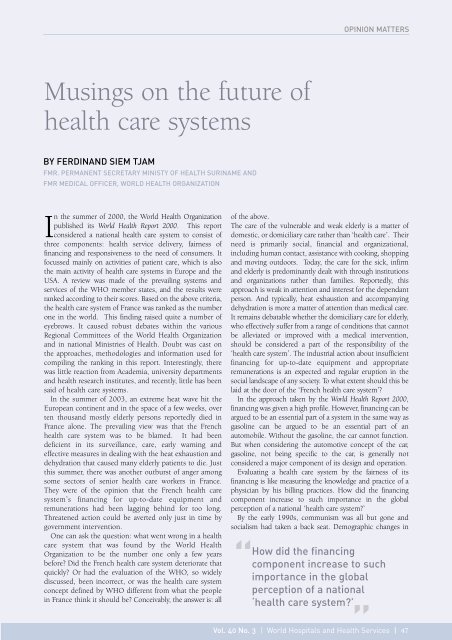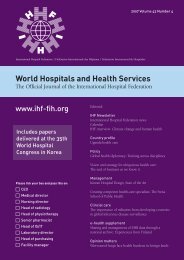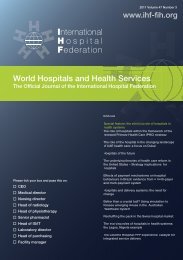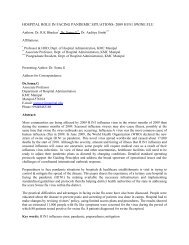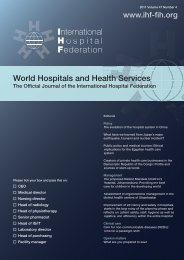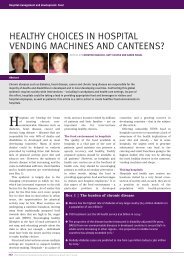World Hospitals and Health Services - International Hospital ...
World Hospitals and Health Services - International Hospital ...
World Hospitals and Health Services - International Hospital ...
You also want an ePaper? Increase the reach of your titles
YUMPU automatically turns print PDFs into web optimized ePapers that Google loves.
OPINION MATTERS<br />
Musings on the future of<br />
health care systems<br />
BY FERDINAND SIEM TJAM<br />
FMR. PERMANENT SECRETARY MINISTY OF HEALTH SURINAME AND<br />
FMR MEDICAL OFFICER, WORLD HEALTH ORGANIZATION<br />
In the summer of 2000, the <strong>World</strong> <strong>Health</strong> Organization<br />
published its <strong>World</strong> <strong>Health</strong> Report 2000. This report<br />
considered a national health care system to consist of<br />
three components: health service delivery, fairness of<br />
financing <strong>and</strong> responsiveness to the need of consumers. It<br />
focussed mainly on activities of patient care, which is also<br />
the main activity of health care systems in Europe <strong>and</strong> the<br />
USA. A review was made of the prevailing systems <strong>and</strong><br />
services of the WHO member states, <strong>and</strong> the results were<br />
ranked according to their scores. Based on the above criteria,<br />
the health care system of France was ranked as the number<br />
one in the world. This finding raised quite a number of<br />
eyebrows. It caused robust debates within the various<br />
Regional Committees of the <strong>World</strong> <strong>Health</strong> Organization<br />
<strong>and</strong> in national Ministries of <strong>Health</strong>. Doubt was cast on<br />
the approaches, methodologies <strong>and</strong> information used for<br />
compiling the ranking in this report. Interestingly, there<br />
was little reaction from Academia, university departments<br />
<strong>and</strong> health research institutes, <strong>and</strong> recently, little has been<br />
said of health care systems.<br />
In the summer of 2003, an extreme heat wave hit the<br />
European continent <strong>and</strong> in the space of a few weeks, over<br />
ten thous<strong>and</strong> mostly elderly persons reportedly died in<br />
France alone. The prevailing view was that the French<br />
health care system was to be blamed. It had been<br />
deficient in its surveillance, care, early warning <strong>and</strong><br />
effective measures in dealing with the heat exhaustion <strong>and</strong><br />
dehydration that caused many elderly patients to die. Just<br />
this summer, there was another outburst of anger among<br />
some sectors of senior health care workers in France.<br />
They were of the opinion that the French health care<br />
system’s financing for up-to-date equipment <strong>and</strong><br />
remunerations had been lagging behind for too long.<br />
Threatened action could be averted only just in time by<br />
government intervention.<br />
One can ask the question: what went wrong in a health<br />
care system that was found by the <strong>World</strong> <strong>Health</strong><br />
Organization to be the number one only a few years<br />
before? Did the French health care system deteriorate that<br />
quickly? Or had the evaluation of the WHO, so widely<br />
discussed, been incorrect, or was the health care system<br />
concept defined by WHO different from what the people<br />
in France think it should be? Conceivably, the answer is: all<br />
of the above.<br />
The care of the vulnerable <strong>and</strong> weak elderly is a matter of<br />
domestic, or domiciliary care rather than ‘health care’. Their<br />
need is primarily social, financial <strong>and</strong> organizational,<br />
including human contact, assistance with cooking, shopping<br />
<strong>and</strong> moving outdoors. Today, the care for the sick, infirm<br />
<strong>and</strong> elderly is predominantly dealt with through institutions<br />
<strong>and</strong> organizations rather than families. Reportedly, this<br />
approach is weak in attention <strong>and</strong> interest for the dependant<br />
person. And typically, heat exhaustion <strong>and</strong> accompanying<br />
dehydration is more a matter of attention than medical care.<br />
It remains debatable whether the domiciliary care for elderly,<br />
who effectively suffer from a range of conditions that cannot<br />
be alleviated or improved with a medical intervention,<br />
should be considered a part of the responsibility of the<br />
‘health care system’. The industrial action about insufficient<br />
financing for up-to-date equipment <strong>and</strong> appropriate<br />
remunerations is an expected <strong>and</strong> regular eruption in the<br />
social l<strong>and</strong>scape of any society. To what extent should this be<br />
laid at the door of the ‘French health care system’?<br />
In the approach taken by the <strong>World</strong> <strong>Health</strong> Report 2000,<br />
financing was given a high profile. However, financing can be<br />
argued to be an essential part of a system in the same way as<br />
gasoline can be argued to be an essential part of an<br />
automobile. Without the gasoline, the car cannot function.<br />
But when considering the automotive concept of the car,<br />
gasoline, not being specific to the car, is generally not<br />
considered a major component of its design <strong>and</strong> operation.<br />
Evaluating a health care system by the fairness of its<br />
financing is like measuring the knowledge <strong>and</strong> practice of a<br />
physician by his billing practices. How did the financing<br />
component increase to such importance in the global<br />
perception of a national ‘health care system?’<br />
By the early 1990s, communism was all but gone <strong>and</strong><br />
socialism had taken a back seat. Demographic changes in<br />
How did the financing<br />
component increase to such<br />
importance in the global<br />
perception of a national<br />
‘health care system?’<br />
“<br />
”<br />
00 | <strong>World</strong> <strong><strong>Hospital</strong>s</strong> <strong>and</strong> <strong>Health</strong> <strong>Services</strong> | Vol.40 Vol. No.2 40 No. 3 | <strong>World</strong> <strong><strong>Hospital</strong>s</strong> <strong>and</strong> <strong>Health</strong> <strong>Services</strong> | 47


